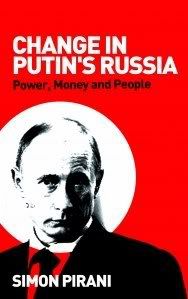UPDATE, February 2014. I visited Moscow last week for the first time in nearly six years, after – apparently – the decision to deny me entry (see below) was reversed. It was good to be back, and I hope I’ll be able to visit again. I won’t be writing on this blog, for now, though … that was too long a break in the rhythm. The rest of this post, written in April 2011, explains why there was a long gap. [end of update]
This blog was always “occasional”, as it says in the heading – and now it’s going dormant. The reason is that I can not visit Russia … and, try as I do to follow its life from a distance, that gets harder as time passes.
I was denied entry to Russia three years ago by the security services, and a few weeks ago, despite having a gold-plated invitation from the “right” sort of people, had a visa application rejected because I am “forbidden to enter Russia” (the embassy’s words). I’m continuing to try to get this decision reversed, but that might take a while.
In June 2008, I arrived at Domodedovo airport with a multi-entry visa and was sent straight back to London by the migration service (which answers to the security service, the FSB). The Russian consul in London told me I had been denied entry under a catch-all clause of the law governing who comes and goes that refers to “national security”, “the defence capability of the state”, etc. My guess is that my problem stems from meeting the “wrong” people (who were themselves under surveillance), rather than writing the “wrong” things, although I don’t know. (Pretty much all there is to say about this was said at the time by the Campaign for the Protection of Journalists, who wrote a letter to the president here http://cpj.org/2008/09/cpj-asks-russia-to-allow-journalists-entry.php).
Since then, I have continued, in my work as a researcher and journalist, to follow the Russian economy (and you can see the sort of thing I write on http://www.simonpirani.com or the web site of the Oxford Institute for Energy Studies). But keeping in touch with Russian events in a broader sense is tough. And I’m not sure I can add anything valuable for you, dear reader. If you want to know what’s going on, try some of the links on the right hand side. If you’re wondering how I am, try my other sites. This one will stay live – there’s a fair bit of stuff accumulated on it – but from now on I’ll add to it only rarely, or when my luck changes. Thanks for visiting, anyway!



 Posted by Simon Pirani
Posted by Simon Pirani 